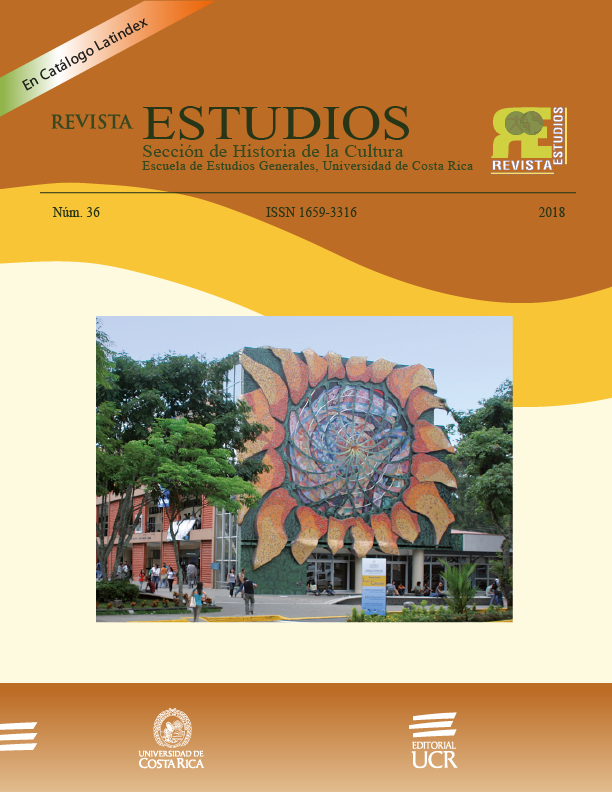Abstract
This article approaches the television series Mad Men (2007-2015) by scriptwriter, director, and producer Matthew Weiner. First, it sees the story as a discourse and an event. It analyzes the narrative voice, that is who narrates and what does he narrate, as well as the aspects related to the reception, to whom or what he narrates; that means, particularly, the narrative features which emphasize the construction of the gaze. Second, the work envisions three key ideas that highlight, to a certain extend, the organization of the represented world. These three key ideas are: prostitution as an identifying and corporative brand, maternity as an obstacle, and women as male discourse. Although this article can be read as a standalone piece of work, it has been written as a continuation of previous essays about the spatial and temporary construction of the series, and the shape of the story as a wholeReferences
Agamben, Giorgio (2007) Infancia e historia. Trad. de Silvio Mattoni. Buenos Aires: Ediciones Adriana Hidalgo (AH).
Allen, E. (2014). Mad Men, Mad World: Sex, Politics, Style & the 1960s.Critical Quarterly,56(1), 99-102. doi:10.1111/criq.12099.
Amoretti H. María (1992) Diccionario de términos asociados en teoría literaria. 1ra.ed. San José, C.R: Editorial de la Universidad de Costa Rica.
Bajtín, Mijaíl (1989) Teoría y estética de la novella. Madrid: Taurus.
Baudrillard, Jean (1997) Las Estrategias fatales. Barcelona: Anagrama.
Bennet, Laura (2015) An Interview W ith the Real-Life Ad Man Who Created That Coca-Cola Commercial. Recuperado de: http://www.slate.com/blogs/browbeat/2015/05/18/mad_men_finale_and_coke_an_interview_with_the_real_life_ad_man_who_created.html, el 21/07/2016.
Berger, John ( ) Modos de ver(Ways of Seeing)
Brea, José Luis (2010) Las tres eras de la imagen. Madrid: Ediciones Akal.
Bowman, J. (2015). All the latest fashions.New Criterion,33(9), 57-60.
Breger, E. (2015). Serial Offenders.New Republic,246(1), 46-49. / Breger, E 2015, 'Serial Offenders',New Republic, 246, 1, pp. 46-49, Academic Search Complete, EBSCOhost, viewed 10 August 2015.
Camacho Ordóñez, Rafael. (2005). Televisión de calidad: distinción y audiencia.Comunicar,Sin mes, 29-32.
Cuadrado Alvarado, Alfonso. (2011). El estilo de Mad Men: La Desarticulación del drama televisivo. Revista de Comunicación No. 9 (1), pp. 34-48.
Cullen, Jim (2003) The American Dream: A short History of an Idea That Shaped a Nation.New York: Oxford University Press.
de Groot, J. (2011). 'Perpetually dividing and suturing the past and present': Mad Men and the illusions of history.Rethinking History,15(2), 269-285. doi:10.1080/13642529.2011.564833
ELDER, S. (2015). How To Succeed in Business Without Really Dying.Newsweek Global,164(15), 52-56.
Erreguerena Albaitero, M. J. (2013). La construcción de la memoria colectiva sobre los hechos democratizantes: Estados Unidos en los sesenta y la serie de televisión Mad Men. (Spanish).Cotidiano -Revista De La Realidad Mexicana,28(181), pp. 47-53.
Falkof, Nicky. (2012) The father, the failure and the self-made man: masculinity in Mad Men. Critical Quarterly,54(3), 31-45. doi:10.1111/criq.12003.
Franco, Yago (Octubre, 2011) Deseo de esamujer. En: El psicoanalítico, Laberintos, entrecruzamientos y magmas. No. 11.
Galán, Ilia (2013) El romanticismo y sus mutaciones actuales. Madrid: Dykinson.García G. Francisco y Rojas Mario (Coordinadores) (2011) Narrativas audiovisuales: el relato. Madrid: Ediciones Icono 14.
Gaudreault, A. y Jost F. (1995) El relato cinematográfico: Ciencia y narratología. Barcelona: Paidós Ibérica, S. A.
Gómez Tarín, F y Marzal Felici, J. (sr) Una propuesta metodológica para el análisis del texto fílmico. Recuperado de: http://apolo.uji.es/fjgt/TyF%20cine.PDF, 11/10/2016.
Goodlad, L. E. (2012). The "Mad Men" in the Attic: Seriality and Identity in the Narrative of Capitalist Globalization.Modern Language Quarterly,73(2), 201-235. doi:10.1215/00267929-1589176
Irwin, W. (2010).Mad Men and philosophy: nothing is as it seems(Vol. 28). R. Carveth, & J. B. South (Eds.). John Wiley & Sons.
Lamas, Marta. (enero-abril, 2000).Diferencias de sexo, género y diferencia sexual. En: Revista Cuicuilco [en linea] 7.Recuperado de http://www.redalyc.org/articulo.oa?id=35101807 [Fecha de consulta: 25 de octubre de 2016].
Lorenzo, F. C., Oñate, C. G., & Peyró, C. F. (2013). Los paisajes del sueño americano: escenografía de 'Mad Men'.Revista de Comunicación de la SEECI, (32), 1-11.
Maloyed, C. L. (2014). Mad Men and the Virtue of Selfishness.Journal Of Popular Film & Television,42(1), 16-24. doi:10.1080/01956051.2013.787041. Academic Search Complete, EBSCOhost(accessed August 10, 2015).
Oleaga, María Cristina. (Octubre, 2011) Ellas. En: El psicoanalítico, Laberintos, entrecruzamientos y Magmas, No. 7.
Palomares, Chiqui (2015) La verdadera historia del anuncio que explica el final de Mad Men. Recuperado de http://verne.elpais.com/verne/2015/05/21/articulo/1432194915_827284.html(21(05/2015).
Poniewozik, J. (2014). The Last Days of Culture Mad Men.Time,183(13), 42.Academic Search Complete, EBSCOhost(accessed August 10, 2015).
Requena, J. G. (2010). Crónicas del vacío. En:Mad men: Reyes de la Avda. Madison. Madrid: Capitán Swing Libros(pp. 21-30).Ricoeur, P. (2004) Freud: Una interpretación de la cultura. BuenosAires, Madrid, México: Siglo XXI, Editores.
Ricoeur, P. (2004) Tiempo y Narración. 5ta ed. en español. México: Siglo XXI Editores.Sloterdijk, Peter (2007) Crítica de la razón cínica. Trad. de Miguel Angel Vega. Madrid: Siruela.
Stoddart, S. F. (Ed.). (2011).Analyzing Mad Men: Critical essays on the television series. McFarland.Talens Jenaro y Zunzunegui, Santos (eds.) (2007). Contracampo. Ensayos sobre teoría e historia del cine. 1ra ed. Madrid: Cátedra.
Tomassi, Wanda (2002) Filósofos y mujeres. Ladiferencia sexual en la historia de la filosofía. Madrid, España: Narcea Ediciones.
Tudor, D. (2012). Selling Nostalgia: Mad Men, Postmodernism and Neoliberalism.Society,49(9), 333-338. doi:10.1007/s12115-012-9557-5.
Vásquez Roca, Adolfo. (sr)Sloterdijk; extrañamiento del mundo, abstinencia, drogas y ritual, consultado desde: http://www.filosofia.net/materiales/num/num22/Sloterdijk.htm, 20/01/2016).
VV. AA. (2010) Guía de Mad Men: Reyes de la Avenida Madison. Madrid: Capitán Swing.Vázquez, Isabel (2015) Me llamo Peggy Olson. El retrato de una auténtica heroína entre los Mad Men. Barcelona: Ediciones B.


